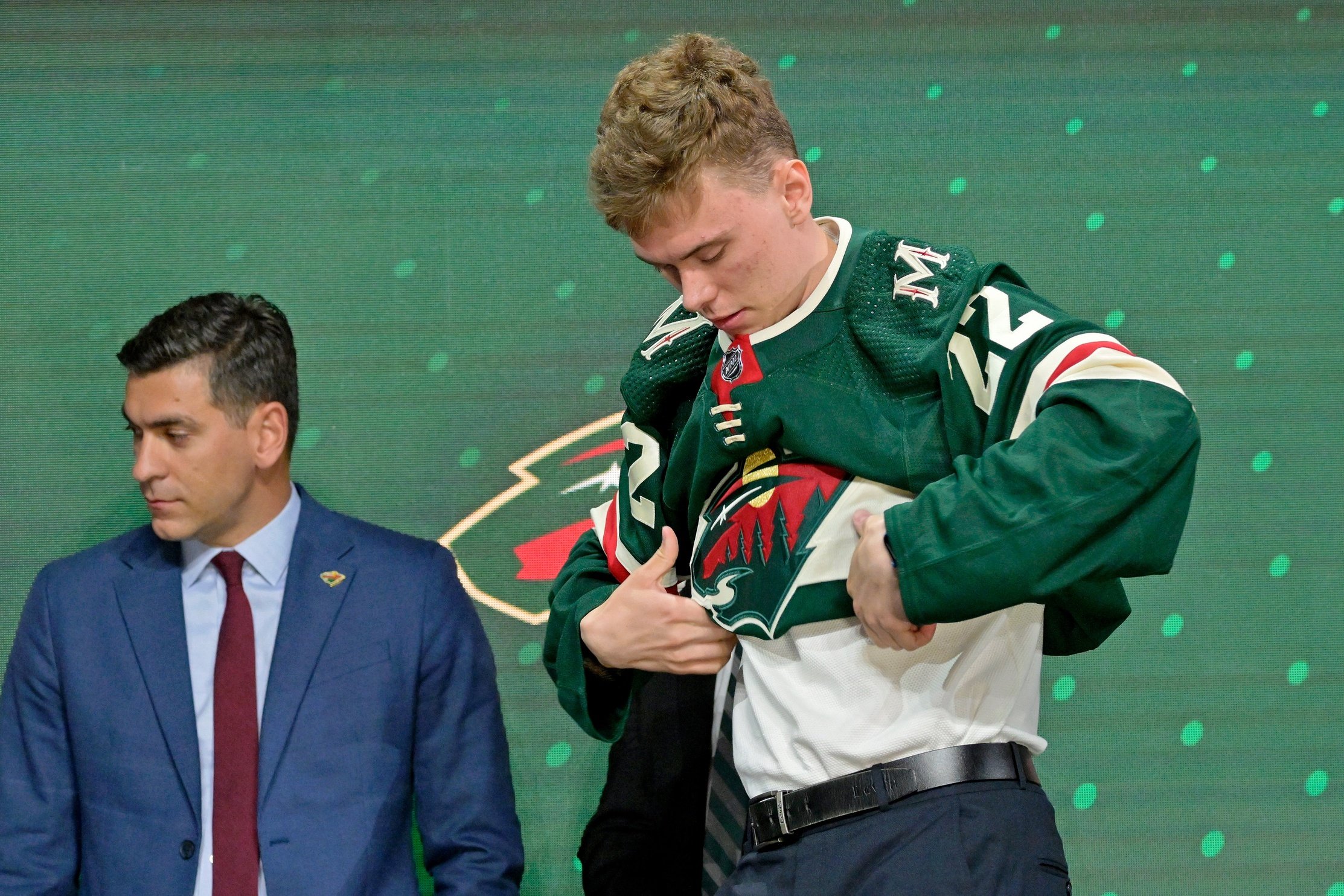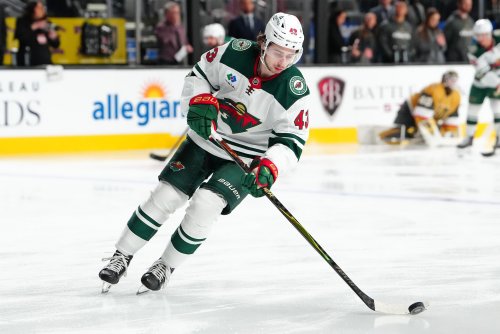
The KHL playoffs are ongoing, and on Friday, Danila Yurov found himself on the ice for the first time since February 15. Unfortunately for his hopes of winning back-to-back Gagarin Cups, Metallurg Magnitogorsk fell to 0-2 in their best-of-seven first-round series. Of course, an early exit in the KHL might not close the book on Yurov playing in more playoff games.
The Minnesota Wild have to be hopeful for the possibility of having Yurov at their disposal for the playoffs, which are now less than three weeks away. However, it's not as simple as, say, signing Zeev Buium once his season at Denver is over. When it comes to the Wild and Russia, how could it be any other way?
Yurov will be in a situation where he's technically under contract until May 31 and unable to sign with Minnesota unless the team agrees to release him. It's possible -- Marat Khusnutdinov was able to exit his contract early -- but Metallurg is under no obligation to accommodate Yurov. Any fan who had to sit through the ordeal of bringing Kirill Kaprizov to North America has earned the right to cast any hope for a smooth, uncomplicated transaction with suspicion.
Until a definitive answer to this question comes up, you can expect the Will They/Won't They? machine to hit full-steam in the next few weeks. It will be a massive question throughout April, and it'll likely obscure an even more important one.
Namely, how likely is Yurov to help the Wild in the playoffs, anyway?
It's easy to draw a one-for-one parallel between Yurov and Kaprizov. By the time Kaprizov got to the Wild, he was a highly-touted forward with 200-plus KHL games and a Gagarin Cup under his belt. Similarly, Yurov is considered a top prospect, has played 200 KHL games, and lifted the Garagin himself. But there's one big difference between the two.
Kaprizov arrived in the NHL fully formed as a 23-year-old. He was just three months shy of his 24th birthday. His resume came with not one but four playoff runs in the KHL. There was no development left, essentially.
Meanwhile, Yurov would be thrown into the NHL playoffs at just 21 years and four months. Beyond that, Kaprizov was ruled ineligible for the playoffs during the COVID bubble, meaning he got to log 50-plus NHL games before seeing postseason action. Yurov's season can't end until April 1 and could easily go longer. If you allow for the fastest possible timeline -- an April 1 elimination and 72 hours to negotiate a release, sign a contract, fly halfway across the world, figure out where to live, etc. -- Yurov will get five games, max, before seeing the playoffs.
That's such a whirlwind that it feels impossible to know what to expect. Especially since we don't have a baseline of what Kaprizov might have done in August 2019 if he had been playoff-eligible.
But do we have anything to go off of? Looking back since the 2010 Draft, there are few examples of a Russian forward who was a bonafide, top-level prospect and went straight from the end of the KHL season to have a meaningful role in the Stanley Cup playoffs. As far as I can tell, it's happened just once: Last year, Ivan Miroshnichenko played six regular-season games for the Washington Capitals before getting in the playoffs.
He played one game, registering zero points and two shots in nine minutes and 31 seconds. So, we don't have much information on KHL prospects going straight from Russia to the playoffs.
However, we have more information on what many top Russian prospects, who had the benefit of acclimating to a North American league before the postseason, did in their first trips to the playoffs. Let's take every first-round Russian forward drafted from 2010 to 2019*, plus a couple of bonus prospects, and look at their playoff debut (minimum two games).
Vladimir Tarasenko, 2012-13 (age 22): 6 GP; 4 goals, 0 assists
Valeri Nichushkin, 2013-14 (age 18): 6 GP; 1 goal, 1 assist
Nikita Kucherov, 2013-14 (age 20): 2 GP; 1 goal, 0 assists
Evgeny Kuznetsov, 2014-15 (age 22): 14 GP; 5 goals, 2 assists
Vladislav Namestnikov, 2014-15 (age 21): 12 GP; 0 goals, 1 assist
Pavel Buchnevich, 2016-17 (age 21): 5 GP; 0 goals, 1 assist
Andrei Svechnikov, 2018-19 (age 18): 9 GP; 3 goals, 2 assists
Denis Gurianov, 2019-20 (age 22): 27 GP; 9 goals, 8 assists
Klim Kostin, 2022-23 (age 23): 12 GP; 3 goals, 2 assists
Vasily Podkolzin, 2023-24 (age 22): 2 GP; 0 goals, 0 assists
That's 10 players who managed to make it to the NHL and play some kind of role for a playoff team. Combine them all, and we're looking at 26 goals and 17 assists (43 points) in 95 games. For an 82-game pace, that's a fairly solid 22-goal, 37-point season, looking similar to Marco Rossi's rookie year (21 goals, 40 points).
But of course, we're not looking at the regular season. We'd be talking about a seven-game series, not an 82-game marathon. Compress those paces into a playoff series, and we can expect around two goals and an assist (matching Kaprizov's playoff debut) for a full seven-game affair -- with a ton of variance. That's not a perfect guess. We don't know how big a disadvantage it is to have zero to five regular-season games of NHL experience. Still, it's probably the best guess we've got.
Is it worth throwing the kid into the fire if Minnesota's "expected" reward is just two goals and three points? Not to get too depressing, but... have you seen the Wild in the playoffs?
Look back at Minnesota's 2023 series with the Dallas Stars, and you'll see four players (Freddy Gaudreau, Ryan Hartman, Mats Zuccarello, Marcus Johansson) who had multiple goals for the Wild. Go back another year (2022 vs. the St. Louis Blues), and that number drops to two: Kaprizov and Joel Eriksson Ek. Mind you, both of these series went six games.
It's possible, even if Minnesota can get Yurov to the NHL and up-to-speed enough so John Hynes will put him in playoff games, that he won't impress. Better players have disappointed in the playoffs -- look how we're waiting for Matt Boldy's postseason breakout. Yurov could easily languish in limited minutes, get shut out by hot goaltending, or simply not be ready for primetime yet. It's a risk.
However, in the context of the Wild's recent history, it is not huge. The biggest reason for Minnesota's postseason stagnation has been a lack of goals. The Wild have scored just 2.26 goals per game in the playoffs since 2020-21, which is dead-last among the 23 NHL teams with postseason games. When you're looking up at the Seattle Kraken, Montreal Canadiens, and the New York Islanders, it's safe to say you've got a problem generating offense.
As is the case with Buium, introducing Yurov to the playoff mix would give Minnesota a level of upside that they simply don't have right now. Even when healthy, Minnesota's struggled to produce offense when Kaprizov's not on the ice. This team is largely identical to the one who couldn't score against St. Louis in 2022 or Dallas in 2023. It will probably be difficult to get him to St. Paul, but once he's here, it will not be hard to find a spot where he can add some desperately needed scoring punch.
*Not including players who've never played in the Stanley Cup Playoffs, such as Alexander Burmistrov, Nail Yakupov, Kirill Marchenko, et al.
Think you could write a story like this? Hockey Wilderness wants you to develop your voice, find an audience, and we'll pay you to do it. Just fill out this form.
-
 2
2
-
 2
2




.thumb.jpg.3818a5c4985e878d5ecaf2e7234883d8.jpg)

Recommended Comments
Join the conversation
You can post now and register later. If you have an account, sign in now to post with your account.
Note: Your post will require moderator approval before it will be visible.